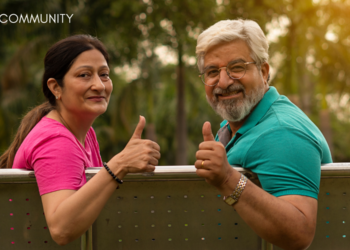Not many know this. However, good oral health is essential for a healthy body and prevention of many age-related diseases. In India, we don’t visit a dentist unless we get toothaches or some other issue troubles us. Our survey on the dental care topic revealed that 64.7% of seniors visit dentists only when necessary. Regular cleaning is also foregone as it is expensive. Some do not brush their teeth twice or rinse after every meal. Our survey corroborated that 64.7% of seniors brush their teeth once a day, while only 35.3% brush after every meal. Not being meticulous about brushing can cause oral health issues such as gum disease, tooth loss, pains, etc.
Tooth issues can trouble you more as you age. Tooth loss can make people lose their confidence to smile. Hence, it is always better to be proactive about your oral health. On the brighter side, we are happy to mention our survey found our seniors to be much more aware of this. A resounding 29.4% proudly rated their oral health as a pristine 5 out of 5, while an overwhelming 70.6% ranked it as a commendable 4. Also, 29.4% of our seniors opt for an annual visit, and 5.9% attend bi-annual check-ups. These numbers tell us how committed our seniors are to their oral health, and it matters. Let us tell you why.
Oral health link to other health issues

Join Now >
In case you are one of those who think what’s the big deal, here are some eye-opening insights to chew upon!
Gum inflammation (gingivitis) raises your risk for lung and heart disease, blood vessel blockage, and even strokes, says research. You already know that age is a risk factor for dementia. However, studies have shown tooth loss from periodontitis or gum disease can increase your risk of dementia.
So, does brushing longer or harder help? According to the Indian Dental Association website, you must brush for at least two minutes. However, brush lightly, as brushing hard can damage your gums. Thankfully, 100% of seniors agree that brushing harder does not mean cleaner teeth. They know it’s about technique and not force. It is better to use a brush with softer bristles and brush in the same order daily. Change your brush at least once in three months and brush at least twice daily, but not more than thrice a day. You may choose to have a mid-day brush after your lunch.
Common tooth problems in seniors
Let us now look at some of the common tooth issues that occur in seniors.
Root decay: When your dental care is not as meticulous as it should be, it causes a build-up of plaque and tartar, leading to tooth decay. It leads to cavities, infections, tooth pain, or tooth loss. Such issues may be observed more in people who have arthritis and dementia as they are not able to clean as required by themselves.
Receding gums: Poor dental hygiene can cause gums to shrink away from your teeth. Family history and smoking can also be factors contributing to this issue.
Dry mouth: As we age, chances of decreased saliva production may happen. Some medications also cause this as a side effect. As a result, acid builds up in the mouth, increasing the risk of cavities.
Darkened teeth: We consume a lot of stain-causing foods across our lifetime. And it slowly builds up to darkened teeth in our old age. Sometimes, the reason is the thinning of the outer enamel layer of the teeth.
Tooth loss: All dental issues, if not treated timely, can result in tooth loss.
Gum disease: Gum diseases are commonly caused by the bacteria in plaque and tartar, though smoking too is a contributing factor. What starts as inflammation of the gums can lead to periodontitis and more problems.
Denture-induced stomatitis: This issue only occurs if you are using dentures and are not caring properly. Ill-fitting dentures can also cause this issue.
7 Tips for dental care
- Prevention is better than cure and also, and dental treatment is expensive. So, here is what you can do.
- Choose a fluoride-based toothpaste or one recommended by your dentist.
- Rinse regularly- before and after brushing and after every meal.
- Brush at least twice daily for at least two minutes. Use an electric toothbrush if you have mobility issues.
- Find the correct brushing technique. You can sort this during a dentist visit as they can guide you best if you feel your technique is ineffective.
- Discuss with your doctor and floss as suggested to ensure more effective dental care.
- Plan for an annual check-up. Always visit a dentist if you suspect any problems and do not self-medicate.









